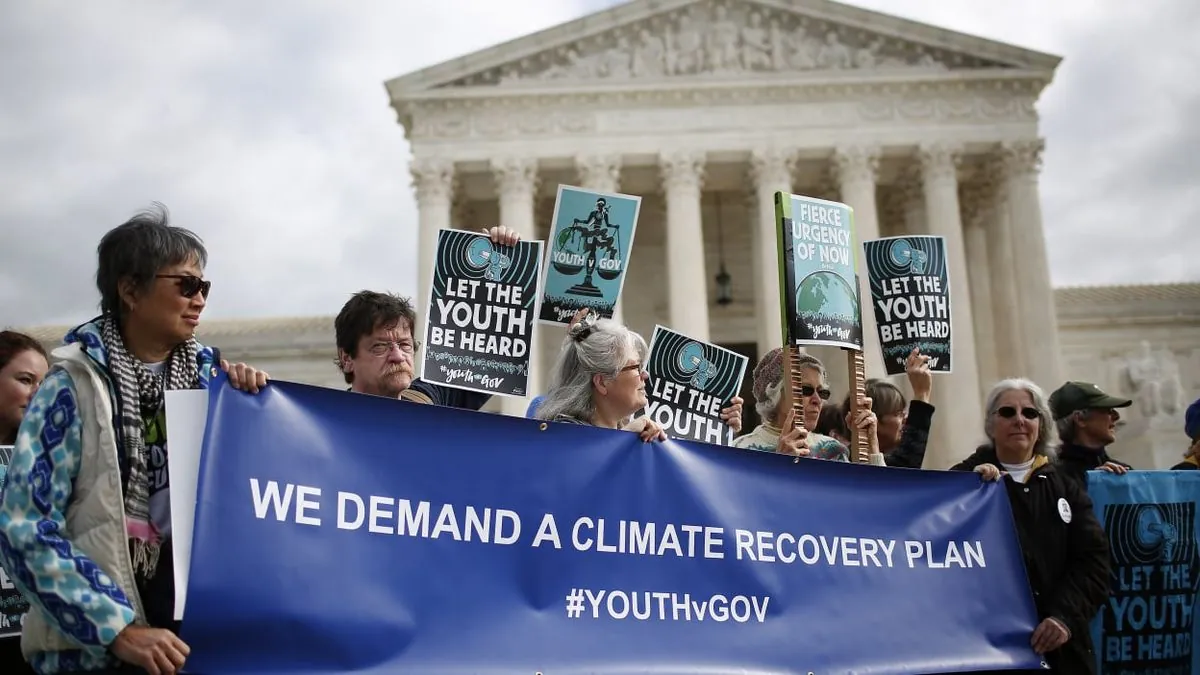Youth Activists Urge Supreme Court to Revive Climate Lawsuit Against U.S. Government
Twenty-one young activists have petitioned the U.S. Supreme Court to reinstate their climate change lawsuit against the government. The case, dismissed by lower courts, claims U.S. energy policies violate constitutional rights.

In a bold move, twenty-one young activists have petitioned the U.S. Supreme Court to breathe new life into their climate change lawsuit against the federal government. This action, taken on September 12, 2024, marks the latest development in a legal battle that began nearly a decade ago.
The case, initially filed in 2015, alleges that U.S. energy policies infringe upon the constitutional rights of young people by exacerbating climate change. The plaintiffs argue that the government's actions in permitting and subsidizing fossil fuel extraction violate their rights to due process and equal protection under the Constitution.
The journey of this lawsuit through the legal system has been complex. In May 2024, the 9th U.S. Circuit Court of Appeals ordered a federal judge in Oregon to dismiss the case, a decision the young activists are now challenging. They contend that the appeals court exceeded its jurisdiction by intervening pre-trial to order the dismissal.

This case is part of a broader trend of climate litigation initiated by young people across the United States. While some similar cases have faced setbacks, others have made significant progress. In 2023, a Montana judge ruled that the state was violating young people's rights by prohibiting regulators from considering climate change impacts in fossil fuel project assessments. Additionally, in June 2024, Hawaii reached a groundbreaking settlement with youth activists, committing to decarbonize its transportation system by 2045.
The federal lawsuit at hand argues that the U.S. government has knowingly contributed to climate change through its energy policies. This claim touches on fundamental constitutional principles, including the Due Process and Equal Protection Clauses, which are cornerstones of the Fifth and Fourteenth Amendments.
"The 9th Circuit clearly and indisputably exceeded the lawful exercise of its prescribed jurisdiction in intervening in the case pre-trial to order its dismissal."
The case highlights the evolving nature of environmental law and public interest litigation in the United States. Since the establishment of the first major U.S. environmental law in 1970, the legal landscape has continuously adapted to address new challenges, including climate change.
As the Supreme Court considers this petition, it's worth noting that the U.S. Constitution does not explicitly mention climate change or environmental protection. This fact underscores the novel nature of the young activists' arguments and the potential for this case to set a significant legal precedent.
The outcome of this petition could have far-reaching implications for climate policy and intergenerational equity in environmental law. As the world grapples with the urgent need to address climate change, the role of the judiciary in shaping environmental policy remains a subject of intense debate and scrutiny.


































